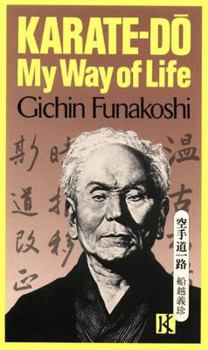Karate-Do: My Way of Life
Select Format
Select Condition 
Book Overview
Customer Reviews
Rated 5 starsOne of the First Men Who Brough Karate into the Modern Age
Funakoshi Gichen was many things to many people. Although today he is for the most part remembered and respected as the founder of the style we know today as Shotokan, Funakoshi Gichen was also a school Teacher, a family man, a man educated in the Confucian classics, a practitioner and teacher of Karate, and an Okinawan who undertook the task of bringing the art of Karate-Do from its native island of Okinawa to the Japanese...
0Report
Rated 5 starsFrom the Mouth of the Master
Ginchin Funakoshi has been credited with modernizing karate. He is also the first to open a dojo (karate school) in Tokyo. Whether he is actually the father of modern Karate or not is not relevant because he is truly a recognized Grand-Master. This is his story of both his life, karate, and the philosophies the martial artist follows. He also explodes some of the more famous myths that seem to surround karate and other...
0Report
Rated 5 starsReading Into Technique
This autobiography of the Father of Modern Day Karate exposes the character behind the legend and may surprise the student raised in awe of a superior teacher. Using anectdotes of past masters and lessons in his own life, Funakoshi is able to explain the philosophy of karate clearly and concisely. Anyone attempting Shodan in Shotokan Karate should definately read this book so that they can read into the basic techniques...
0Report
Rated 5 starsPerfect for any karate student!
This is probably the most important book for any student of Shotokan karate-do to read, and is extremely helpful for a student of ANY karate style or method. I first read this book when I was beginning my training, and besides Funakoshi's biography already being a very fascinating read, I found the insight into the mind of the greatest karate master in modern history to be extremely useful in understanding what Karate-Do...
0Report
Rated 5 starsThe Point is Communicated
I was overwhelmed by the feeling this book and this man generated. Even though the book resembles a brief of his memoirs, Funakoshi communicates the attitude, mood, and a small glimpse of the mindset one should bring to the study of karate. One might find the humble nature of this man's writings subtly profound in many aspects. The expectations I had before reading the tome were cleverly diverted, and my appreciation...
0Report















